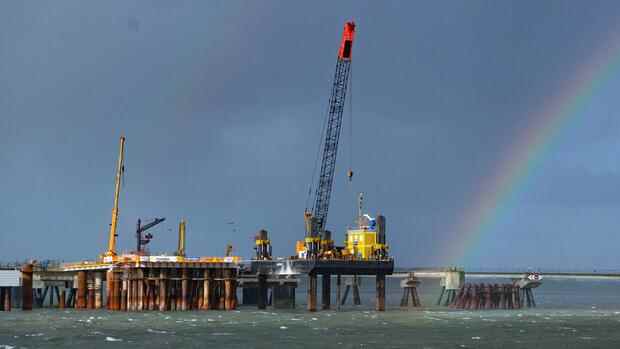Berlin, Brussels It seemed like a declaration of war when Ursula von der Leyen said at the beginning of October that the EU was no longer willing to pay every price that was asked for gas. For months, large EU countries have been demanding that Brussels cap prices, and more and more have been asked. The commission seemed ready to deliver.
You should do that this Tuesday. The heads of state and government are meeting in Brussels on Wednesday and Thursday. If the summit does not find an answer, the dispute could escalate.
However, what the Commission is now going to present is hardly suitable for reconciling the two positions. The draft of their proposal is available to the Handelsblatt.
And the only form of gas price cap that can be found in the documents is an interim solution for perhaps just a few weeks, which is technically controversial and, according to experts, poorly worked out.
Specifically, the authority will propose a “market correction mechanism” at the Title Transfer Facility (TTF), a virtual trading point in the Netherlands, which it can use to “limit the consequences of periods of extreme prices”. “Extreme fluctuations and jumps in prices” are to be prevented and speculation prevented, which made supply difficult for some member states.
The German federal government has been slowing down the plans for weeks. A gas price cap is one of the worst of the many bad proposals, according to government circles before the new proposal from the Commission.
Berlin fears that the energy crisis will worsen
The problem with price caps is that providers typically look for other ways to circumvent the cap. They could therefore sell their gas to customers outside Europe or trade outside of the TTF, which would mean that the EU Commission would no longer have access.
In this case, there is a risk that Norwegian gas, for example, will no longer end up in the EU, according to Berlin. This would tend to exacerbate the energy crisis, as imports into the EU will become more difficult and competition between EU countries for gas imports will intensify.
“I’m skeptical whether the Commission’s proposal can be implemented in this way,” says energy expert Lion Hirth from the Hertie School in Berlin. “I guess I lack the creativity there.” The Commission is obviously driven by the demands of the Member States, which, however, do not always make sense. “Capping prices can cause a market collapse,” he says.
The Commission wants to enshrine in law that its market intervention will not endanger the security of supply, will not increase gas consumption, will not disrupt the flow of gas within the EU and will not impair the functioning of the markets. However, how this is supposed to work is not explained there. If the law were passed in this way, it would be up to the Commission officials to take these points into account.
>> Read here: Energy prices are driving smaller gas suppliers into trouble
Capping TTF prices would also have an effect on existing long-term gas contracts. Because how much money is paid under these long-term contracts is often derived from the TTF price.
Commission works on gas price index
The new instrument is only intended to be available for a transitional period, and this could be quite short. Because if the Commission is actually to intervene in the market, the EU states would have to enact a law to do so. It could be a few more weeks before it comes into force.
At the same time, however, the Commission is working on its own gas price index that better reflects the new realities on the gas market, especially the switch from pipeline to LNG gas, than the TTF price. This index is to be introduced at the end of 2022 and will then make the price cap superfluous.
The summit meeting on Wednesday and Thursday will show whether the proponents of a gas price cap will be satisfied with this transitional solution. However, a majority of 17 of the 27 states had called for much more, such as a binding wholesale price cap for gas or at least a price cap on gas used to generate electricity. According to the leaked documents, the Commission is not proposing this. There is also no talk of a capped import price.
>> Read here: Ego trip or smart course? Scholz defends “double boom” against criticism from EU partners
“The Spanish model of a fixed price cap is off the table, and that’s really good,” commented Green energy politician Michael Bloss. “This would have opened the floodgates for gas consumption.” The correction mechanism is more flexible and offers the possibility of purchasing gas at higher prices if there is a shortage.
Another point of contention is provisions in the event of a gas shortage. The Commission wants binding rules that the EU states should help each other out in the event of empty storage. This should actually be agreed for years in bilateral agreements between the states. However, Germany in particular had problems reaching agreement with its supplier countries, the Netherlands and Belgium.
What the states will probably commit to is a joint procurement of gas on the world markets. There has been a platform for this since spring, and now the EU Commission wants to be given additional powers by law to get the idea up and running. The EU states should ensure that at least 15 percent of the gas they fill their storage facilities with is purchased via the common platform. Germany had resisted, but finally gave up the resistance.
Gas companies should also be allowed to set up consortia so that they can act as one on the world market and negotiate better prices.
More: Gas prices fall to three-month low
